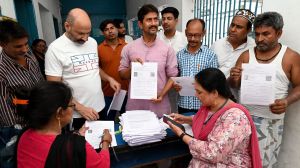Click here to join Express Pune WhatsApp channel and get a curated list of our stories
After spending Rs 136 crore on residents’ proposals last year, Pimpri-Chinchwad Municipal Corporation invites budget suggestions again
The Pimpri-Chinchwad Municipal Corporation will launch the 2026–27 edition of its 'participatory budget’ initiative on Independence Day, inviting residents to decide how 10% of property tax collections should be invested in their neighbourhoods.
 Building on this success, the PCMC will launch the 2026–27 edition of the initiative on August 15, inviting residents to once again decide how 10 per cent of property tax collections should be invested in their neighbourhoods, officials said. (Credit: Pixabay)
Building on this success, the PCMC will launch the 2026–27 edition of the initiative on August 15, inviting residents to once again decide how 10 per cent of property tax collections should be invested in their neighbourhoods, officials said. (Credit: Pixabay)On Independence Day, the Pimpri-Chinchwad Municipal Corporation (PCMC) will launch its ”participatory budget” initiative for 2026-27, wherein it will invite residents to once again decide how 10 per cent of the property tax collections should be invested in their neighbourhood.
Last year, several residents of Pimpri-Chinchwad saw their suggestions and ideas turn into reality. ”From funding for new roads in Punawale and upgraded footpaths in Charholi to new infrastructure works in Ravet, Pimpri Chinchwad’s residents saw their ideas turn into reality under last year’s Participatory Budget,” the civic administration said in a press release issued on Wednesday.
In the 2025–26 cycle, the PCMC received 2,279 citizen proposals from its eight zones. After detailed technical scrutiny, 786 were accepted and 499 were funded. The final allocation of Rs 136.98 crore for these proposals exceeded the earmarked Rs 94.86 crore, much beyond the reserve when public priorities were clear, officials said.
Building on this success, the PCMC will launch the 2026–27 edition of the initiative on August 15, inviting residents to once again decide how 10 per cent of property tax collections should be invested in their neighbourhoods, officials said.
Zone D, covering Punawale, Tathawade, Wakad, and Pimple Saudagar, emerged as the largest beneficiary, with Rs 43.88-crore funding allocated for major road works, stormwater upgrades, and parks. Zone B, including Ravet and Kiwale, saw funding worth Rs 20.60 crore, ranging from new road networks to a new municipal school in Ravet.
Projects reflected the top demands across the city: roadworks, footpaths, park improvements, waste management, and stormwater drainage.
Distinctive local priorities also emerged, such as CCTV installation for public safety in Zones A and F, urban street design-compliant footpaths in Thergaon, and railway overpass development in Pimpri Gaon.
Shekhar Singh, Municipal Commissioner, PCMC, said in the statement, “The participatory budget shows how governance works best when it is inclusive. Last year’s projects are living proof that citizen input leads to results residents value most. This is more than infrastructure—it’s about building trust and shared ownership in the city’s progress.”
Praveen Jain, Chief Accounts and Finance Officer-cum-Director, PCMC, said, “Every rupee in the participatory budget is a reflection of the community’s priorities. The process ensures transparency, accountability, and the satisfaction of knowing public funds are working where they are most needed, as identified by the people themselves.”
Click here to join Express Pune WhatsApp channel and get a curated list of our stories







